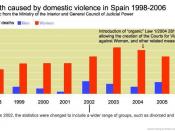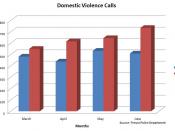The courts' attitudes towards contact in domestic violence cases were in desperate need of change about thirty years ago. The courts' presumed that contact was in the best interest of the child. The only way this presumption could be rebutted was by having a 'cogent' reason, but the courts' took a strict approach on what constituted a 'cogent' reason. This attitude was causing severe damage, as many children were being greatly affected, physically and mentally, by being ordered to maintain contact with their mother's abuser, and in some cases their own abuser. There has been much research on the effect contact has on children, and the courts have finally started to take notice of this.
For many years domestic violence was a hidden matter. It is only recently that it has been debated publicly and the seriousness of it recognized. The police may now receive up to 1,300 calls a day , and a recent campaign has been launched publicizing the help that is available for women.
It has been problematic to define it and even the term 'domestic violence' has given rise to debates, as some believe it belittles the violence to only being 'domestic.' The Law Commission has pointed out that 'domestic violence' can take many forms:
"...physical abuse to include any form of physical, sexual or psychological molestation or harassment which has a serious detrimental effect upon the heath and well-being of the victim..." It has now been recognized that the 'victim' can include men and children, where the perpetrator is their wife/mother. In this dissertation the focus is on the courts' changing attitudes where the victim is the mother and child. Women tend to leave a violent home environment when the violence begins to spill over onto the children. Dobash and...


